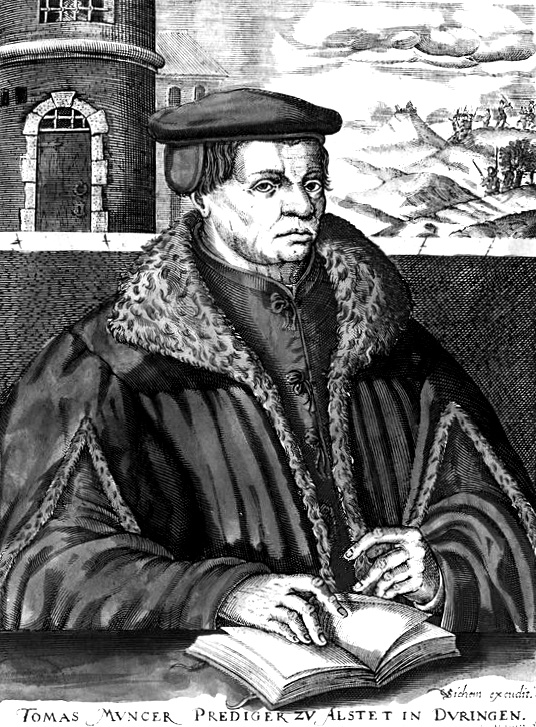Thomas
Müntzer plays a rather interesting role in history. He is a complicated
character, making strides in the reformation of the church and even larger
strides for the ideas of Marxists. Little is known about his up
bringing except that he was the son of a burgher (a member of the wealthy
bourgeoisie). He was given a humanist education, becoming a linguist, learning
Greek, Hebrew and Latin. Also, completing a course in Biblical theology.
Müntzer later became a priest and during this time he became attracted to the
works of Martin Luther.
He studied the works of Luther and
was said to have listened to his lectures. However, after all the teachings
Müntzer viewed Luther’s ideology of “scripture alone”. With educational
background Müntzer felt the need to come to his own conclusions on the
interpretation of the Bible. He took a
more extremist view, regarding the passages in revelation. The apocalyptic passage portrayed the classic
struggle between the righteous and evil. It was difficult for him to separate
the word from a spiritual and separate perspective, which could be attributed
to part of the cause of the peasants revolt. He translated that struggle into
the class struggle between the peasants and the wealthy. His revolutionary concept of the inevitable conquest of the anti - Christian earthly government and the thesis that the someone people themselves were the instruments of God and would have to execute this change. He believed that the peasants would lead the struggle against the enemies of the Holy Spirit in the last days, which he believed was the in mid 16th century. (Britannica) During the peasant revolt t he peasants had great
faith in Müntzer and later assured his followers that in upcoming war that
there would be a divine intervention and their lives would be spared. However,
as history states, there was no divine intervention but instead a mass
slaughter.
Yes, this was very tragic but what
really intrigued me is how Marxists view this a very crucial part in their
history. Marxists believed that after
the apocalypse the world would become a proletariat state where the workers own
and run everything. They saw the uprising and his ideologies a foreshadowing of
their version of the future. When East Germany
became a communist state they told stories of how Müntzer was a hero, A tragic
hero, tragic because of his death. He was a “part of history’s inevitable,
inexorable move towards the East German State.” (PBS)
http://www.pbs.org/wgbh/pages/frontline/shows/apocalypse/explanation/muentzer.html
http://www.britannica.com/EBchecked/topic/397713/Thomas-Muntzer
http://gameo.org/index.php?title=M%C3%BCntzer,_Thomas_(1488/9-1525)#1987_Update

Great post! I have never heard of Müntzer before and it is very interesting to see how the Marxists and their ideas were influenced by him. I didn't know that.
ReplyDelete